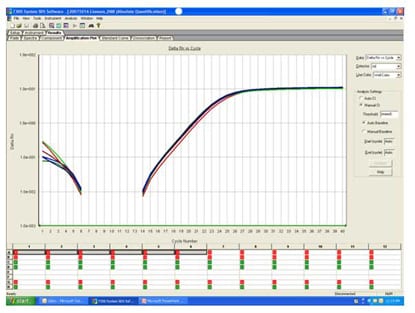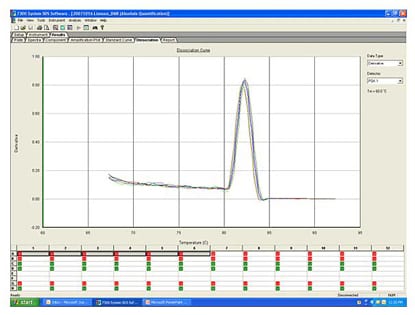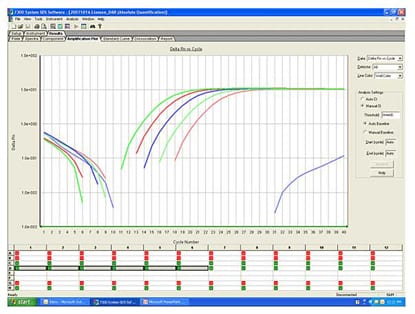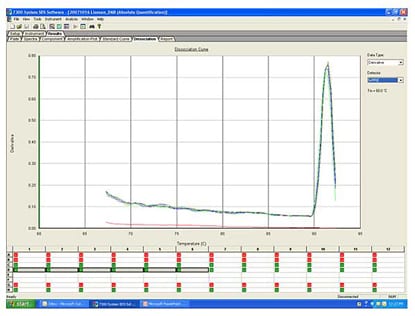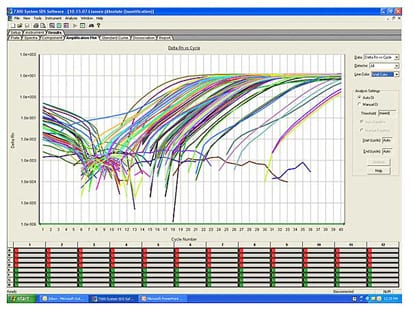Global UltraRapid™ Lentiviral Titering Kit
- Fast—get data more quickly than what’s possible with conventional p24 ELISA titer kits (< 3 hours from cells-to-titer!)
- Accurate—relies on highly quantitative qPCR measurement of lentiviral titers
- Easy—isolation and/or concentration of genomic DNA is NOT required
- Quantitative—built-in reference control simplifies normalization.
- Dynamic—obtain titering quantitation up to 15 MOI
Products
| Catalog Number | Description | Size | Price | Quantity | Add to Cart | |||
|---|---|---|---|---|---|---|---|---|
| LV961A-1 | UltraRapid Lentiviral Global Titering Kit (Human and Mouse compatible) | 42 Reactions | $881 |
|
||||
Overview
Overview
When you need to know—quickly and easily determine lentiviral titers
With a fast and simple workflow, the Global UltraRapid™ Lentiviral Titering Kit, delivers critical lentiviral titer information so you can move more quickly to the next step, whether that’s transduction of target cells in your own lab or delivery of packaged virus particles to another lab.
- Fast—get data more quickly than what’s possible with conventional p24 ELISA titer kits (< 3 hours from cells-to-titer!)
- Accurate—relies on highly quantitative qPCR measurement of lentiviral titers
- Easy—isolation and/or concentration of genomic DNA is NOT required
- Quantitative—built-in reference control simplifies normalization.
- Dynamic—obtain titering quantitation up to 15 MOI
- Compatible—works with most WPRE-containing lenti-constructs (g. pLVCT-H1, pLVTHM, pGIPz, HiPerform™ and all SBI lentivectors)
References
How It Works
How It Works
Directly measure infectivity with no background from inactive virus
The Global UltraRapid Lentiviral Titer Kit rapidly determines the titer of pseudovirus particles by measuring the copy number of integrated lentiviral constructs in transduced target cells. By comparing the ratio of endogenous Ultra Conserved Region 1 (UCR1) DNA elements:lentivector-specific WPRE elements to a calibration curve generated with supplied standards, the Kit delivers highly quantitative measurement of the infectivity of the pseudoviral preparation.
Compatible with most WPRE-containing lentivector constructs—including pLVCT-H1, pLVTHM, pGIPz, HiPerform™ and all SBI lentivectors—the Kit contains all of the components needed to measure the number of endogenous UCR1 DNA elements and pseudo-lentiviral-specific WPRE elements. Even better, because the UCR1 primers are completely compatible with both human and mouse genomes, you can titer from either cell type.
The workflow is quick and simple:
- Lyse infected cells (2 minutes at 95°C)
- Add qPCR Mastermix from the Kit to the cleared lysate
- Run a real-time PCR reaction (2 hours)
- Analyze results
Supporting Data
Supporting Data
Sample data from different Global UltraRapid Viral Titering Kit experiments
Figure 1. Amplification plot of UCR1 genomic DNA from the included calibration standards.
Figure 2. Dissociation curves of the amplified UCR1 products.
Figure 3. Amplification plot of the WPRE DNA from the calibration standards.
Figure 4. Dissociation curves of the amplified WPRE products.
Figure 5. Amplification plot of a sample experiment.
FAQs
Documentation
Citations
Related Products
Products
| Catalog Number | Description | Size | Price | Quantity | Add to Cart | |||
|---|---|---|---|---|---|---|---|---|
| LV961A-1 | UltraRapid Lentiviral Global Titering Kit (Human and Mouse compatible) | 42 Reactions | $881 |
|
||||
Overview
Overview
When you need to know—quickly and easily determine lentiviral titers
With a fast and simple workflow, the Global UltraRapid™ Lentiviral Titering Kit, delivers critical lentiviral titer information so you can move more quickly to the next step, whether that’s transduction of target cells in your own lab or delivery of packaged virus particles to another lab.
- Fast—get data more quickly than what’s possible with conventional p24 ELISA titer kits (< 3 hours from cells-to-titer!)
- Accurate—relies on highly quantitative qPCR measurement of lentiviral titers
- Easy—isolation and/or concentration of genomic DNA is NOT required
- Quantitative—built-in reference control simplifies normalization.
- Dynamic—obtain titering quantitation up to 15 MOI
- Compatible—works with most WPRE-containing lenti-constructs (g. pLVCT-H1, pLVTHM, pGIPz, HiPerform™ and all SBI lentivectors)
References
How It Works
How It Works
Directly measure infectivity with no background from inactive virus
The Global UltraRapid Lentiviral Titer Kit rapidly determines the titer of pseudovirus particles by measuring the copy number of integrated lentiviral constructs in transduced target cells. By comparing the ratio of endogenous Ultra Conserved Region 1 (UCR1) DNA elements:lentivector-specific WPRE elements to a calibration curve generated with supplied standards, the Kit delivers highly quantitative measurement of the infectivity of the pseudoviral preparation.
Compatible with most WPRE-containing lentivector constructs—including pLVCT-H1, pLVTHM, pGIPz, HiPerform™ and all SBI lentivectors—the Kit contains all of the components needed to measure the number of endogenous UCR1 DNA elements and pseudo-lentiviral-specific WPRE elements. Even better, because the UCR1 primers are completely compatible with both human and mouse genomes, you can titer from either cell type.
The workflow is quick and simple:
- Lyse infected cells (2 minutes at 95°C)
- Add qPCR Mastermix from the Kit to the cleared lysate
- Run a real-time PCR reaction (2 hours)
- Analyze results
Supporting Data
Supporting Data
Sample data from different Global UltraRapid Viral Titering Kit experiments
Figure 1. Amplification plot of UCR1 genomic DNA from the included calibration standards.
Figure 2. Dissociation curves of the amplified UCR1 products.
Figure 3. Amplification plot of the WPRE DNA from the calibration standards.
Figure 4. Dissociation curves of the amplified WPRE products.
Figure 5. Amplification plot of a sample experiment.


